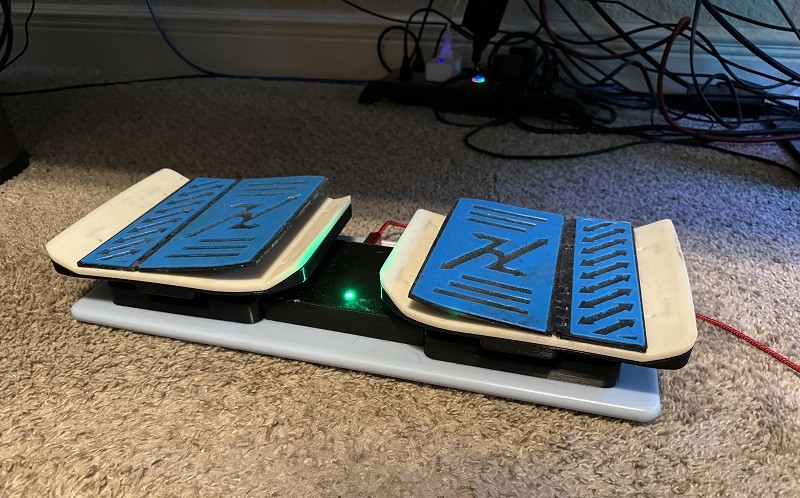"Mostly, we have not really evolved how we actually control games," says chief marketing officer and co-founder John Warren. "We’ve added back button and mics, but I would argue we’re getting to a place where we have more options but not more control."
The idea for the Glydr came about when co-founder and chief inventor Rick Tett was watching his nephew ride around on a hoverboard. Tett noticed how much control could actually be maintained with the feet, and it got him wondering how this could be applied to video games. Years of tinkering and demos at events like OpTic Off-Season led to the creation of the Glydr.
Foot-based controllers are already on the market, but they're geared toward high-end racing gamers and those who enjoy flight simulators. The Glydr is designed to be an addition to any gaming experience by allowing players to map any function to foot pedals, which have multiple sensors for maximum customization. The idea is that the feet take over for the overworked hands and arms, reducing stress and adding new options in play styles.
Warren uses Armor Core 6 as an example. The mech shooter was developed by FromSoftware, which is famous for a couple of things: intense difficulty and inconvenient use of thumbstick triggers for essential functions. Elden Ring players know that a key battle can be lost when accidentally dismounting by pressing L3. Warren found that Armor Core 6 was often more than even modern controllers could handle, and he repeatedly clicked incorrectly during play.
"Ethan Gach at Kotaku said in his review, 'The PS5 DualSense was not built for this,'" Warren says. "He might as well have been writing our copy for us. There are some games that are begging for more control, to be able to play longer, to have more fun."
Earlier this year, Glydr launched a successful Kickstarter to pre-sell its controller. As of March 4 it had raised $83,355 from 454 backers. Units will begin shipping by the end of the year. The company plans to launch presale events for new stock between now and spring of 2025, when the controller should be available for regular purchase.
A Controller for Disabled Players
Obviously, the controller also has some incredible possibilities for disabled players. "If that can duplicate the function of my track ball with scroll wheel, and it looks like it probably can, that would take a burden off my grumpy shoulder," says Dallas gamer Karen Kubliski, who suffers from carpal tunnel and a lingering injury. "I find computer games as intense as my telecom job was on shoulders, arms, wrists and hands. The amount of time and mental focus matter for both computer work and computer play. Sometimes my grumpy shoulder absolutely limits my ability to play Minecraft and Dwarf Fortress."
Warren, who is a wheelchair user, has watched the Glydr find an audience among other disabled gamers. One fan of the prototype is Paralympian and Rocket League player Logan Krepop. He has limited mobility on one side of his body, and the Glydr has helped him navigate the intense multiplayer ranks of Rocket League.
"One thing I love about the Glydr is how it's changing the conversation," Warren says. "I had someone try it out at an event. He loved it and said, 'My disabled friends will like this.' I said, 'But you liked it, too!' He said, 'Well, yeah, I hurt my wrist a while ago and sometimes when I play for long times it gets tired.' I think something like Glydr can help people understand that disability is not a monolith. The market for this is wider than you might think."
Controller setups for disabled users are typically in limited supply and very expensive. They are sold as adaptive medical devices, with the usual American medical insurance price tag to show for it. When the Glydr debuts next spring, it will retail for $299. On one hand, that's the price of a new Nintendo Switch. On the other, it's cheaper than a premium racing wheel and pedal controller for a modern console.
There are some downsides to the Glydr. Currently, it works best with PC, Android, and Linux systems. As home consoles appear to be cracking down on third-party peripherals, the Glydr is not plug-and-play with PlayStation, XBox or Switch. If a game can be configured to run on keyboard and mouse, the Glydr will work, though the button mapping will have to be done through a laptop or smartphone. Nonetheless, Warren assures us that it can work on a PlayStation 5.
"We've played a lot of console Fortnite with it," he says.
Then there is the virtual reality component. It's not that the Glydr fails here. The problem is that there is something of a schism over what VR should be.
Amir Valinia is the founder of Houston-based SkydiveSim, which just released SkydiveSim 2.0 as an immersive sky diving experience. He doesn't think the Glydr has much application for his game just yet.
"I still think it is geared to PC users on a flat screen and not VR," he says. "SkydiveSim is mostly geared for VR specially using the Meta Quest 2 and 3, which are an all-in-one solution. So implementing something like this would be more involved for us, and I really don’t see a benefit since it would tie the player down to having to sit. As far as playing a regular PC or console game with this device, I think there would be a learning curve involved that a lot of players may not want to go through. It would also make it more of an activity causing players get tired sooner. I feel like the people that want to be more active during gaming, they would do it in VR with the special treadmills that are on the market."
Valinia does say he thinks it could be a much more adaptable version of pedal-based controllers already used for racing and sim games.
Warren maintains that the Glydr has VR applications. He points out the limitations of the highest-end, full-mobility VR setups like the Virtuix Omni, which are expensive and require a lot of dedicated room in a home to use. As someone who first noticed the physical demands of gaming while playing Legend of Zelda: Skyward Sword on the Wii (lots of swinging around the controller for hours), Warren believes modern gaming is simply taking too much for granted when it comes to player physicality.
"The Virtuix stuff is so cool and amazing, don't get me wrong" says Warren. "The ethos of VR is to fully move in as close a facsimile as reality as possible, but I think there is a sacrifice people are willing to be able to sit at their desk. I think Glydr is selling the reality of VR. It’s not very sexy, but's true. This is a practical solution for disabled people, for people who don’t have a lot of space, that gets you 95 percent of the VR experience."











